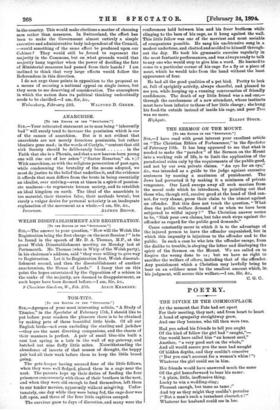THE SERMON ON THE MOUNT.
[To TEE EDITOR OF THE "SPECTATOR."] SIR,—/ have read with great interest your excellent article- on "The Christian Ethics of Forbearance," in the Spectator of February 10th. It has long appeared to me that what is. needed to make the "paradox" of the Sermon on the Mount into a working rule of life, is to limit the application of the- paradoxical rules only by the requirements of the public good, and not by our own private claims. "An eye for an eye," &c., was intended as a guide to the judge against excessive- sentences by naming a maximum of punishment. The Jews had perverted it by making it a minimum of private vengeance. Our Lord sweeps away all such maxims from, the moral code which he introduces, by pointing out that those who, though evil, receive good at the hand of God can, not, for very shame, press their claim to the utmost against an offender. But this does not touch the question, " What- does the public welfare demand of us when we have been subjected to wilful injury ? " The Christian answer seems- to be, "Sink your own claims, but take such steps against the offender as regard for the public good demands."
Cases constantly occur in which it is to the advantage of the injured person to leave the offender unpunished, but in which this impunity is injurious to the offender and to the public. In such a case he who lets the offender escape, from the dislike to trouble, is obeying the letter and disobeying the- spirit of the Sermon on the Mount. We are called on to forgive the wrong done to us ; but we have no right to- sacrifice the welfare of others, including that of the offender.. Anypunishment which a Christian may lawfully bring to bear on an evildoer must be the smallest amount which, in. his judgment, will secure this welfare.—I am, Sir, &c.,
C. G. C..


































 Previous page
Previous page